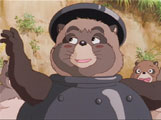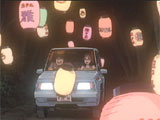

Quick Links:
Pom Poko (Heisei Tanuki Gassen Ponpoko)
You won't find many fictional television shows or movies that deal with the environment as a main theme, and with good reason. It is difficult to present a balanced viewpoint, and a lot of people are simply indifferent to the issue. There are a few works, however, that I would say played the environment card successfully, and they all present their stories either from the angle of man hurting himself by destroying the environment, or by stressing the benefits of taking care of nature. Isao Takahata's Pom Poko presents its story from the viewpoint of the animals being hurt by man's actions and, unfortunately, it just doesn't work too well.
The basic plot of Pom Poko revolves around a group of tanuki (creatures that look like raccoons, but have the ability to morph into other shapes) who live in a forest near the rapidly developing Tokyo. They become alarmed as the construction begins to encroach on their forest, and work together to devise a plan to keep the humans out. The effort gets a slow start, with the elder tanuki deciding to let the younger generation deal with the crisis when their morphing abilities are up to snuff.
Before I go into what makes this film too absurd to fully enjoy, I would be remiss to ignore its merits. While the tanuki agree on removing the humans from the forest, they disagree on how to do it. One group wants to go to battle and kill the humans, while another wants to scare them off. The latter group has more influence at first, and the methods they devise for scaring the humans are genuinely amusing. Of particular note is a sort of "spirit parade" that the tanuki perform for the families living in a new housing development. This parade was a real visual treat, and arguably the most enjoyable scene in the film.
The aspect of the film that really ruins it is a clash between a visual style that carries with it a twisted sense of humor and a premise that is actually sensible. If anything is to be learned from this film, it's that there are times when we have no choice but to adapt to change. The only problem with this sort of premise is that it takes a backseat to the cartoony visuals and off-beat humor. The tanuki are shown in two basic forms: one that is racoon-like, and one where they look more like Winnie the Pooh knockoffs. Unfortunately, the latter is predominate in the film, even though the former fits the premise better.
The worst part of the film, without a doubt, is the strange testicle humor that plagues it. From the "special training" the male tanuki receive on practical uses of their genitals during morphing, to the "testicle assault" used by the battle-hungry tanuki later on, it really makes me scratch my head and wonder what the heck director Takahata was thinking (or how many drugs he was taking, perhaps?) when he made Pom Poko. It may seem like the testicle angle would be amusing, but don't be fooled - it isn't. It does more to detract from the film's enjoyable qualities than any other element. (On a side note, the environmental overtones don't detract from the film in a political sense, but they don't do anything to strenghten the premise either.) What we're left with is a train wreck of ideas - most of which are actually good - that ultimately failed to come together in a meaningful way.
It probably doesn't help that the film uses little background music. What it does use is pleasant and forest-inspired and/or upbeat and fun, depending on which form of the tanuki is on screen at the time. The exotic tune played during the spirit parade is a treat, and the ending theme (Itsudemo dareka ga) is catchy and fun to sing along to. It would have been nice to have more of the traditional folk-style background music in the film, because the scenes that had it were more memorable than those that didn't.
Pom Poko has the distinct honor of being the first and only Ghibli film that I can do without - not only because of the below-the-belt humor that clashed with the overall message, but also the goofy character designs. The film had its high points, and I suppose it merits a single watch - moreso than a significant number of anime TV series do, at least. If I had it to do over, though, this is not a film I would purchase.
Distributor: Disney Creator: Isao Takahata / Studio Ghibli Released: 1994
Plot: C+ Character Design: B Animation Quality: A Music: B Overall: B-



